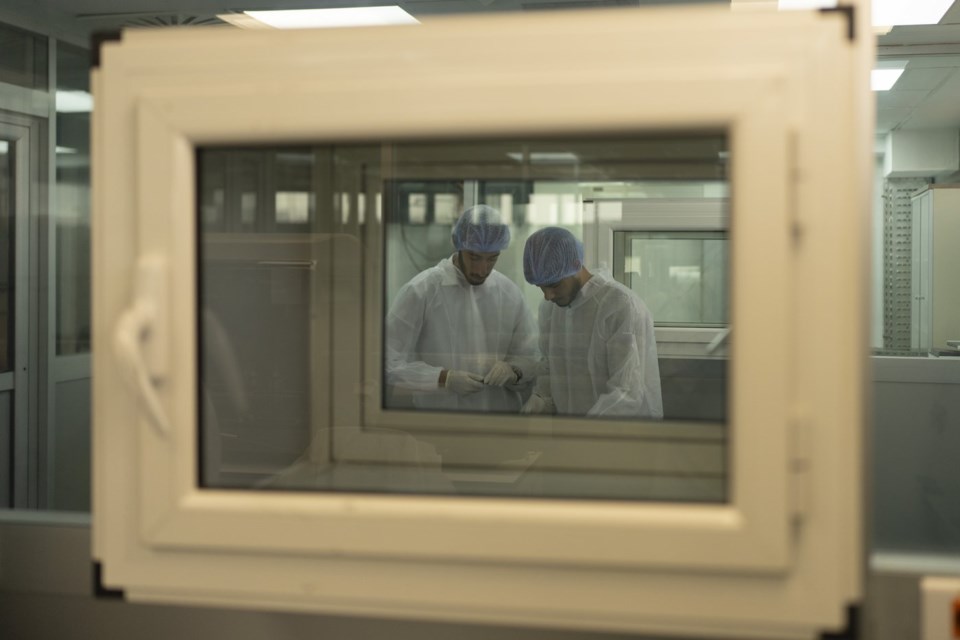TAMESNA, Morocco (AP) — After African countries struggled to get testing kits during the COVID-19 pandemic, officials vowed to make the continent less dependent on imported medical supplies. Now, in a first for Africa, a Moroccan company is filling orders for tests as an outbreak continues.
Moroccan startup Moldiag began developing mpox tests after the World Health Organization in August. Africa’s Centers for Disease Control and Prevention has reported more than 59,000 mpox cases and 1,164 deaths in 20 countries this year.
The WHO has also announced a plan to provide mpox tests, and treatments to the most vulnerable people in the world’s poorest countries, after facing criticism for moving too slowly on vaccines. It recommends all suspected mpox cases be tested.
But in some far-flung areas of the mpox outbreak, tests have to be delivered to distant labs for processing. Most of Congo’s 26 provinces don’t have such facilities. And some areas have no tests. In eastern Congo’s South Kivu province, doctors are still diagnosing patients by taking temperatures and looking for visible symptoms.
That makes it difficult to tell how the virus is spreading, health officials say.
"This is a major problem,” said Musole Robert, medical director of the Kavumu Referral Hospital, one of the few treating mpox patients in eastern Congo. “The main issue remains the laboratory, which is not adequately equipped.”
Mpox primarily spreads through close skin-to-skin contact with infected people or their soiled clothes or bedsheets. It often causes visible skin lesions. A health worker swabs the rash and sends the sample to a lab. Mpox testing is critical because many symptoms resemble diseases like chicken pox or measles.
When mpox cases were found in some Western countries like the United States in 2022, some companies began developing rapid test kits that don’t require lab processing. But they shelved those efforts when the virus was largely contained.
Then outbreaks emerged again in Africa. Scientists are concerned by the spread of a that might be more easily transmitted among people.
Morocco has reported three mpox cases, though most have been in central Africa.
At his factory in Morocco, Moldiag founder and chief scientific officer Abdeladim Moumen said the tests they make — sold for $5 each — can help to remedy shortages affordably.
The company last month began accepting orders from Burundi, Uganda and Congo and has also sold them to Senegal and Nigeria as well.
“It’s rather easy to send tests from an African nation to another one rather than waiting for tests to come in from China or Europe,” Moumen said.
Moldiag was founded out of Morocco’s Foundation for Advanced Science, Innovation and Research, a university-affiliated nonprofit whose research has received funding from the European Commission and Morocco’s government. The startup previously developed similar genetic tests for COVID-19 and tuberculosis.
Moldiag won approval to distribute its mpox tests from the Africa CDC in November. But it hasn't submitted paperwork to be considered for expedited approval from the WHO, which during this outbreak has approved three mpox tests and is considering five others. Each is made in North America, Europe or Asia.
The Africa CDC’s acting director for laboratory diagnostics and systems, Yenew Tebeje, said the organization created a process to accelerate approval of tests like Moldiag’s because the WHO’s approval process can take months or years and “be a limiting factor for access to diagnostics.”
Historically, international institutions have not always ensured medical supplies like tests are quickly made available for crises in Africa, Tebeje added.
Only mpox tests that require laboratory processing have been approved by the WHO and Africa CDC, which has expressed the need for rapid tests that don't need to be sent to labs.
Moldiag and other companies are working to develop rapid tests and pursue approval.
Moldiag's $5 price for the current tests aligns with recommendations from both the WHO's target product standards and demands of health advocates who have criticized the cost of other tests. The nonprofit Public Citizen last month called on Cepheid — one of the WHO's three approved mpox test manufacturers — to reduce its price from about $20 to $5, citing a Doctors Without Borders analysis showing genetic tests can be produced for less.
Africa-based manufacturing fulfills a primary objective that African Union member states agreed on after the COVID-19 pandemic, which revealed global and to medical supplies, including , and antiviral medications.
In 2022, shaken by the pandemic, African leaders called for action to address those disparities plaguing the continent's over 1.4 billion people, who experience the highest incidence of public health emergencies.
Moumen said experts were waking up to the fact that it makes more sense for tests to come from regions where outbreaks are taking place so manufacturers can tailor production to address issues close to home.
"They want African tests for Africa," he said.
___
Alonga reported from Goma, Congo. Houda Benalla contributed reporting from Tamesna, Morocco.
___
The Associated Press receives financial support for global health and development coverage in Africa from the Gates Foundation. The AP is solely responsible for all content. Find AP’s for working with philanthropies, a list of supporters and funded coverage areas at .
Sam Metz And Ruth Alonga, The Associated Press




